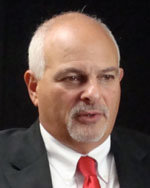
Scott Wasser
Executive Editor, Portland Press Herald
Portland, ME
[ME-E 0201]
Those were in the days when there was no e-mail, so you had to make photocopies of your few articles that you had to send out as tear sheets, copies of your resumes – cost a nickel each time you made a copy – you had to – and then you had put a stamp on the whole big envelope. And I sent out 186.
The first job – the only job offering I got was in a place called Stuttgart, Ark. – a tiny little town. I think the town was about 10,000 or 12,000 population, the newspaper was about 3,000 – 4,000 circulation. I don’t remember exactly. And I went.
I packed up my stuff. I had just gotten engaged at the time, left my wife – my fiancé at the time – behind and drove to Stuttgart, Ark. It was like a culture shock – as big a culture shock as you can imagine.
Anyway while I was there, one of my responsibilities was covering the wildlife commission – whatever it was called – the Fish and Game Commission, whatever. And I went out with one of the commissioners whose job it was to fly over the forests in Arkansas looking for forest fires.
And while we were up there, we started talking – we talked about various things that they were involved in. And one of them was trying to control the beaver population. The part of Arkansas that I lived in was a big rice and soybean producing area, and a lot of what they did depended on irrigation and flooding of crops – controlling water. And there was also a huge beaver population that made that difficult because of their natural dam building.
So the beavers were constantly a problem. They were being trapped and hunted, but it was not controlling the population. And so – I don’t know whether it was the wildlife commission or what group decided that – what they would do – one of the things they would try to do to control the beavers was to bring alligators in from Louisiana, which was just south of Arkansas.
The idea was the beavers didn’t have any natural predators. But the alligators – if they introduced them to the ecosystem – would be a national natural predator and eliminate the beavers.
And the commissioner’s telling me all this I’m listening and I’m thinking, “Well, the beavers are a problem because they’re getting in the farmer’s way, and they’re flourishing. So they’re going to bring in alligators and eliminate the beavers.” And [as] a New York boy standing in Stuttgart, Ark. – the only time I’d ever seen an alligator was on the movie screen.
And it struck me that if I were a farmer the last thing I’d want to be doing is be wading through my fields in hip waders, not knowing if there was an alligator under the water or not – especially an alligator that had just eaten every beaver in sight.
So I turned to the guy and I said, “Now wait a second. If you have a beaver population that has no natural predators, and you bring in alligators that will hopefully survive the winter eventually become a hardy enough breed to survive Arkansas winters and thrive, isn’t that going to pose a greater problem than the beavers do now to the farmers?”
And he looked at me and he said, “Jeez, we hadn’t thought about that – but I guess we’ll have to deal with it when the time comes.”
And I wrote about it. And I wrote a column on it, and I said this is just unbelievable. I don’t know that they ever – that article ever did anything in the philosophy, but as far as I know there are no alligators in that part of Arkansas today. And I do know I got a lot of feedback on the column, and it opened eyes up that had no idea this was going on.
That was the first thing that I – probably the first time that I did anything – in the way of reporting or writing – that I saw a direct impact, or at least what I thought was a direct impact, on society.


